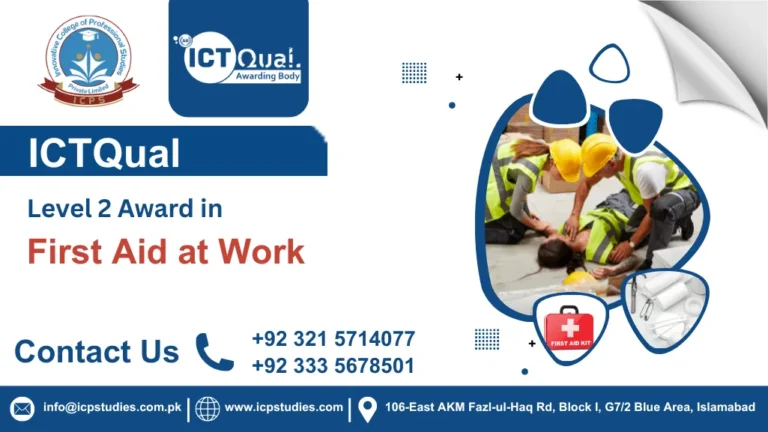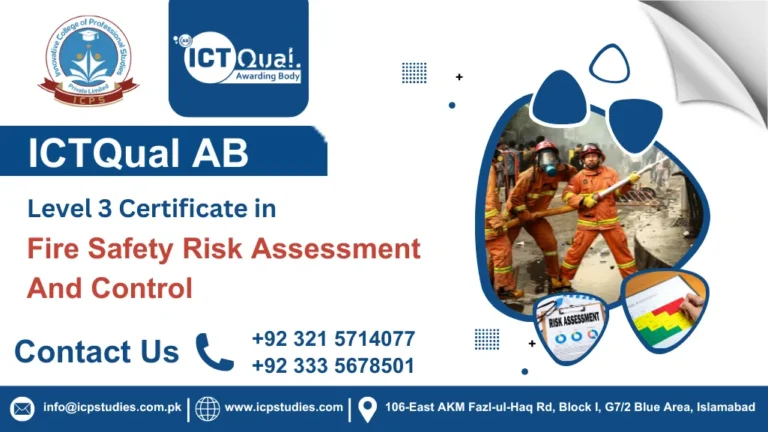Civil engineering is a rapidly growing field with immense opportunities for professionals who are ready to contribute to designing, constructing, and maintaining essential infrastructure. If you’re passionate about shaping the world around you and are looking to boost your career, the ICTQual Level 3 Diploma in Civil Engineering is the perfect qualification to help you achieve your professional goals.
The ICTQual Level 3 Diploma in Civil Engineering (60 Credits) is designed for individuals who wish to pursue a career in civil engineering or construction. This comprehensive course offers advanced knowledge and skills in various civil engineering domains, including structural design, construction management, site supervision, and environmental engineering.
The Level 3 Diploma in Civil Engineering covers core concepts and practical skills related to civil engineering, construction practices, and site management. The course is structured to provide you with a strong foundation in both the theoretical and practical aspects of civil engineering. Through a blend of classroom learning and hands-on activities, you will become proficient in key engineering areas, enabling you to tackle complex engineering projects with confidence.
The ICTQual Level 3 Diploma in Civil Engineering (60 Credits) offers a comprehensive education that combines both theoretical and practical aspects of civil engineering. With a focus on project management, structural design, site supervision, and sustainable practices, this qualification will prepare you for a successful career in civil engineering.
All About ICTQual Level 3 Diploma in Civil Engineering 60 Credits – Six Months
Course Overview
The ICTQual Level 3 Diploma in Civil Engineering (60 Credits) is a comprehensive, industry-recognized qualification designed for individuals who are passionate about pursuing a career in civil engineering or advancing their expertise in the field. Over the course of six months, you will gain a deep understanding of the core principles, methodologies, and practices essential for success in civil engineering.
This diploma covers a wide range of topics including structural design, construction management, site supervision, and sustainability in engineering. It provides you with both the theoretical knowledge and practical skills needed to tackle complex engineering challenges and take on senior roles in the industry.
Whether you’re aiming to work in project management, site engineering, or design, this qualification will help you develop the expertise necessary to work on diverse civil engineering projects, from roadways and bridges to large-scale infrastructure developments.
Through a combination of classroom learning and hands-on assessments, you will become proficient in essential civil engineering concepts and gain the experience required to make meaningful contributions to the construction and infrastructure sectors. With 60 credits and a focus on real-world application, this diploma opens doors to career advancement opportunities, higher salary prospects, and specialized roles in the civil engineering field.
Study Units
- Construction Technology and Materials
- Structural Mechanics and Design
- Site Surveying and Geotechnics
- Health, Safety, and Environmental Practices
- Project Management Fundamentals
- Civil Engineering Drawing and CAD
The ICTQual Level 3 Diploma in Civil Engineering is designed for individuals who have a foundational understanding of engineering principles and are looking to advance their career in the civil engineering field. The entry requirements for this course are as follows:
1. Age Requirement
- Minimum Age: 18 years old
- Applicants should be at least 18 years of age at the time of enrollment to ensure they are ready for the academic and practical demands of the course.
2. Educational Qualifications
- Level 2 Qualification: Applicants must have successfully completed a Level 2 qualification in a related field such as civil engineering, construction, or engineering. This could include a Level 2 Diploma, GCSEs (in mathematics and science), or other relevant certifications.
- Mathematics & Science Proficiency: A solid foundation in mathematics and science is highly recommended, as these subjects are critical to understanding engineering principles.
3. Relevant Work Experience (Optional)
- Industry Experience: While not mandatory, prior work experience in the construction or engineering sectors may be beneficial. Practical exposure to construction sites, project management, or related roles can support your learning experience and help you apply theoretical knowledge to real-world situations.
4. English Language Skills
- Proficiency in English: Applicants should have a good understanding of the English language, both written and spoken. This is essential for understanding course material, engaging in discussions, and completing written assignments.
5. Technical Competence (Optional)
- Basic Computer Skills: Familiarity with standard computer software (e.g., Microsoft Office) and the use of engineering software tools can be advantageous but is not mandatory.
6. Commitment to Learning
- Motivation and Enthusiasm: A genuine interest in civil engineering and a willingness to learn are key factors in successfully completing this diploma. A commitment to developing practical and technical skills is essential.
7. Assessment and Interview (if required)
- Some applicants may be asked to participate in a brief interview or assessment to determine their suitability for the course. This helps ensure that applicants are prepared for the academic and practical challenges the course may present.
By meeting these entry requirements, you’ll be well-prepared to take on the challenges of the ICTQual Level 3 Diploma in Civil Engineering and embark on an exciting career path in civil engineering and construction management.
The ICTQual Level 3 Diploma in Civil Engineering is ideal for individuals who are either looking to enter the civil engineering field or those already working in related sectors who wish to advance their knowledge and skills. This diploma is specifically designed for:
1. Aspiring Civil Engineers
If you are eager to begin a career in civil engineering and are looking to gain comprehensive knowledge in structural design, project management, and construction techniques, this diploma will provide you with the solid foundation needed to kickstart your professional journey.
2. Current Civil Engineering Technicians
If you’re already working as a civil engineering technician or in a technical support role, this qualification will help you expand your expertise and move into more advanced positions such as site engineer, project coordinator, or construction supervisor.
3. Construction Professionals Looking to Specialize
For those in the broader construction industry—whether in general construction, site management, or infrastructure projects—this diploma offers specialized knowledge in structural design, geotechnical engineering, and environmental sustainability, helping you shift into a civil engineering-focused role.
4. Site Supervisors and Construction Managers
If you’re currently working as a site supervisor, foreman, or construction manager, this diploma will equip you with the advanced skills to handle more complex engineering projects, improve your project management techniques, and move into more senior leadership roles in construction and civil engineering.
5. Individuals Transitioning into Civil Engineering
For individuals with a background in other engineering fields or related industries, this diploma offers the knowledge and skills to make a successful transition into the civil engineering sector. Whether you’re coming from mechanical engineering, electrical engineering, or a different discipline, this qualification helps you bridge the gap and specialize in civil engineering.
6. Those Seeking Career Progression
If you’re already employed in civil engineering or construction and are looking to progress to higher-level positions such as project manager, senior civil engineer, or engineering consultant, this diploma will help you gain the advanced knowledge and qualifications necessary for career advancement.
7. School Leavers or Recent Graduates
For school leavers or those who have recently graduated from secondary school, this course is a great opportunity to start a career in civil engineering, especially if you have a background in subjects such as mathematics, physics, or design and technology.
8. Anyone Interested in Infrastructure Development
If you are passionate about shaping cities, designing roads, bridges, and sustainable buildings, and contributing to the growth of infrastructure, this course offers you the tools and knowledge needed to participate in large-scale civil engineering projects.
Conclusion:
The ICTQual Level 3 Diploma in Civil Engineering is suited for anyone who is committed to building a career in civil engineering, whether you are just starting out, looking to specialize, or aiming to advance to higher roles within the industry. With a mix of theoretical learning and practical experience, this diploma will provide you with the expertise needed to succeed in the fast-evolving civil engineering sector.
Learning Outcomes
The ICTQual Level 3 Diploma in Civil Engineering is designed to provide students with a comprehensive understanding of key civil engineering principles, techniques, and technologies. Below are the learning outcomes for each study unit in the program:
1. Construction Technology and Materials
Learning Outcomes:
- Identify and explain the properties and applications of essential construction materials, including concrete, steel, timber, and composites, and their role in civil engineering projects.
- Evaluate material performance based on factors such as durability, cost-effectiveness, and suitability for various construction types (e.g., residential, commercial, infrastructure).
- Understand and apply construction technology techniques, including modern construction methods and material testing to ensure quality and safety.
- Assess the impact of material choices on the sustainability and overall efficiency of construction projects, with a focus on eco-friendly and resource-efficient practices.
2. Structural Mechanics and Design
Learning Outcomes:
- Apply fundamental principles of structural mechanics to assess how different forces (tension, compression, shear, bending) impact structures.
- Perform load calculations for key structural components such as beams, columns, and foundations, considering essential factors like dead loads, live loads, and environmental forces.
- Design basic structural systems in compliance with relevant codes and standards, ensuring safety and efficiency in construction.
- Assess structural stability and identify potential risks or weaknesses in designs, proposing solutions to mitigate or eliminate them.
3. Site Surveying and Geotechnics
Learning Outcomes:
- Use surveying instruments (e.g., total stations, levels, GPS) to accurately measure and record site data, which informs the design and execution of civil engineering projects.
- Interpret topographical maps and site plans to assist in decision-making and to ensure effective project design and implementation.
- Understand soil properties, such as soil types, compaction, and bearing capacity, to design appropriate foundations.
- Apply geotechnical principles in evaluating site conditions, and make informed recommendations for suitable foundation types and soil treatments.
4. Health, Safety, and Environmental Practices
Learning Outcomes:
- Understand and apply health and safety regulations to ensure the safety of workers, the public, and the environment on construction sites.
- Implement risk management strategies to reduce hazards, ensuring projects comply with local and international safety standards.
- Promote sustainable engineering practices by evaluating the environmental impacts of civil engineering projects and suggesting ways to reduce harm to the ecosystem.
- Apply environmental laws and guidelines in construction projects to minimize the ecological footprint and ensure compliance with sustainability goals.
5. Project Management Fundamentals
Learning Outcomes:
- Apply core project management principles to plan, execute, and monitor civil engineering projects efficiently and effectively.
- Develop project schedules and timelines, ensuring the efficient allocation of resources (labor, materials, equipment) to meet deadlines and budgets.
- Monitor project costs by understanding key financial management techniques, including cost estimation, budgeting, and controlling expenditures.
- Assess and manage risks in civil engineering projects, applying strategies to minimize delays, avoid budget overruns, and ensure successful project completion.
6. Civil Engineering Drawing and CAD
Learning Outcomes:
- Create precise technical drawings of civil engineering projects using both traditional drafting methods and modern CAD software.
- Interpret complex engineering designs and blueprints, accurately identifying components, dimensions, and technical specifications.
- Utilize CAD software to design, modify, and visualize structures such as roads, bridges, and drainage systems.
- Produce detailed design documentation that can be used for project planning, permitting, and construction execution, ensuring that all designs are practical and compliant with regulations.
The learning outcomes of the ICTQual Level 3 Diploma in Civil Engineering ensure that graduates are equipped with the essential skills and knowledge to succeed in the dynamic civil engineering industry. By completing this diploma, students gain practical, industry-relevant skills that enable them to contribute to the planning, design, and execution of large-scale civil engineering projects. Whether working on infrastructure, construction, or environmental projects, this qualification provides a solid foundation for a successful career in civil engineering.
FAQs about ICTQual Level 3 Diploma in Civil Engineering 60 Credits – Six Months







